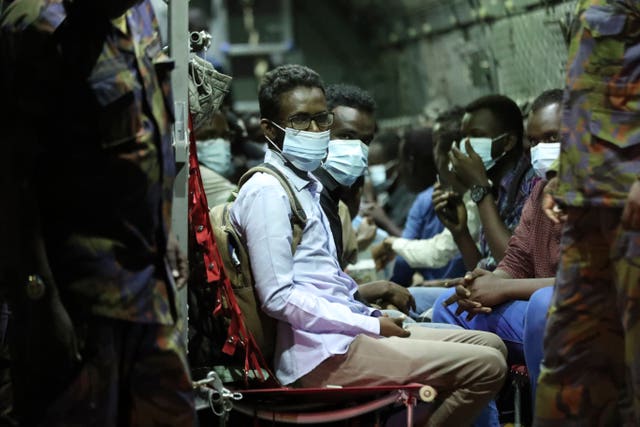Fighting in Sudan shakes three-day truce as thousands flee Khartoum
Clashes escalated in West Darfur province on Tuesday, according to residents.

Sudanese and foreigners have streamed out of the capital Khartoum and other battle zones as fighting on Tuesday shook a new three-day truce brokered by the United States and Saudi Arabia.
So far, a series of short ceasefires in the past week have either failed outright or brought only intermittent lulls in the fighting that has raged between the forces of the country’s two top generals since April 15.
The lulls have been enough for dramatic evacuations of hundreds of foreigners by air and land, which continued on Tuesday.
But they have not been enough to bring relief to millions of Sudanese caught in the crossfire, struggling to find food, shelter and medical care as explosions and gunfire rip through their neighbourhoods.
Calls for negotiations to end the crisis have been ignored, and for many Sudanese, the departure of diplomats, aid workers and other foreigners and the closure of embassies is a terrifying sign that international powers expect the mayhem to worsen.

In Khartoum, bus stations were packed on Tuesday morning with people who had spent the night there in the hope of getting on a departing bus.
Drivers increased prices, sometimes tenfold, for routes to the border crossing with Egypt or the eastern Red Sea city of Port Sudan.
Fuel prices have rocketed, to 67 dollars a gallon from from 4.2 dollars, and prices for food and water have doubled in many cases, the Norwegian Refugee Council said.
Late on Monday, US secretary of state Antony Blinken announced that he had helped broker a new 72-hour ceasefire. The truce was to last until late on Thursday night, extending a nominal three-day truce over the weekend for the Muslim Eid al-Fitr holiday.
The Sudanese military, commanded by General Abdel Fattah Burhan, and the rival Rapid Support Forces (RSF), a paramilitary group led by General Mohammed Hamdan Dagalo, said on Tuesday they would observe the ceasefire. In separate announcements, they said Saudi Arabia played a role in the negotiations.

The army announcement used similar language, adding that it will abide by the truce “on the condition that the rebels commit to stopping all hostilities”.
But fighting continued, including in Omdurman, a city across the Nile River from Khartoum.
Omdurman resident Amin Ishaq said there were clashes early on Tuesday around the state television headquarters and around military bases just outside Omdurman.
“They stop only when they run out of ammunition,” he said.
“Sounds of gunfire, explosions and flying warplanes are still heard across Khartoum,” said Atiya Abdalla Atiya, a senior figure in the Sudan Doctors’ Syndicate, a group that monitors casualties. “They don’t respect ceasefires.”
Clashes escalated in West Darfur province on Tuesday, residents said. Armed groups, wearing RSF uniforms, attacked serval areas in Genena, the provincial capital, burning and looting properties and camps for displaced people.

“All eyes are on Khartoum but the situation here is unimaginable.” In Genena’s centre, women and children were fleeing homes and the city’s main hospital has not functioned for days, with unknown numbers of dead and wounded, she said.
More fighters on motorcycles and horses have entered the city from neighbouring areas to join the battles, with bodies lying in the streets, according to Darfur 24, an online news outlet focusing on covering the war-wrecked region.
Sudan’s western Darfur region is where the RSF has its roots, born from the Janjaweed militias accused of widespread atrocities in putting down a rebellion in the early 2000s.
More than 420 people, including at least 291 civilians, have been killed and over 3,700 wounded since the fighting began. Electricity and the internet are cut off in much of the country, and hospitals are near collapse.
Even before April 15, one-third of Sudan’s population of 46 million relied on humanitarian assistance. Most of those providing aid have suspended operations.
Those who are able have made their way to Egyptian border, Port Sudan or relatively calmer provinces along the Nile but the full scale of displacement has been difficult to measure.
At least 20,000 people have fled from Khartoum to the city of Wad Madani, 100 miles to the south, the UN Office for the Coordination of Humanitarian Affairs said.
Some 20,000 Sudanese have fled to Chad and around 4,000 South Sudan refugees living in Sudan have returned home, said Olga Sarrado, spokesperson of the UN refugee agency UNHCR. The agency is gearing up for tens of thousands more to flee to neighbouring countries.
“The fighting looks set to trigger further displacement both within and outside the country,” she said.





